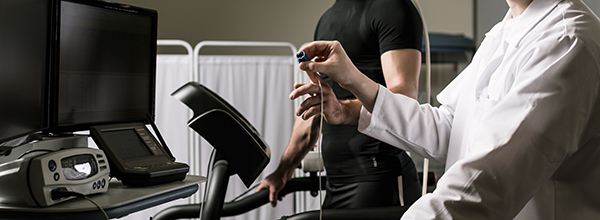Nuclear Stress Test

A Nuclear Exercise Stress Test can play a vital role in diagnosing and managing many types of cardiovascular disease, including coronary artery disease, the leading cause of death in the United States. A nuclear exercise stress test is a diagnostic test used to evaluate blood flow to the heart.
What is a Nuclear Exercise Stress Test?
Nuclear medicine uses tiny amounts of radioactive materials (“radiotracers”) to capture images of your organs and blood vessels. The radiotracers are injected into your bloodstream shortly before your stress test. Once injected, the radiotracers emit signals that can be tracked by the nuclear imaging device, which in turn uses the signals to create images that show how the blood flows in and around your heart.
Nuclear stress testing can be used to diagnose heart and blood vessel diseases, and it can also be used to look for signs of heart damage following a heart attack or other cardiovascular event. Sometimes, nuclear stress tests are used to manage treatment, using the imaging results to determine how well a specific treatment is working.
Information Data Includes
- The size of the heart chambers
- How well the heart is pumping blood
- Whether there is any damage to the heart
- If there is any blockage or narrowing of the coronary arteries that provide blood to the heart
- The effectiveness of any current treatment.
Nuclear Stress Test Preparation
Failure to comply with these instructions can result in cancellation of your test.
- Please hold blood pressure medicines such as beta-blockers and calcium channel blockers for at least 24 hours prior to testing – unless otherwise advised by your physician. A common list of beta-blockers and calcium channel blockers are listed below:
- Atenolol, Bisoprolol, Bystolic, Calan, Carvedilol, Cardizem, Clonidine, Coreg, Diltiazem, Inderal, Labetalol, Lopressor, Lotensin, Metoprolol, Propanolol, Tanoretic, Toprol. Amlodipine, Nicardipine, Norvasc, Procardia, and Verapamil.
- Also, Erectile Dysfunction medications should be held for 12 hours prior to testing such as Viagra or Cialis.
- Do not eat or drink anything containing caffeine for 12 hours prior to the test. This includes coffee, tea, soft drinks (including decaffeinated), chocolate, headache medicine and powders, and sinus medicines.
- No smoking or nicotine products 4 hours prior to test.
- Do not eat or drink anything within 6 hours of test, except water. Water intake is encouraged and is actually beneficial.
- Bring a list of your medications – both prescription and non-prescription. Also bring missed morning doses of medicines. They can be taken after nuclear testing.
- If you are an insulin dependent diabetic – please check with your physician for dosing instructions.
Call to Schedule an Appointment
Alpharetta Internal Medicine Office
1380 Upper Hembree Rd.
Roswell, GA 30076
Cumming Internal Medicine Office
950 Sanders Rd
Cumming, GA 30041

